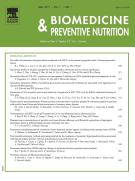The efficiency of polyphenolic compounds on allergen induced hyperreactivity of the airways - 26/11/11
 , M. Joskova a, M. Sutovska a, E. Novakova b, K. Adamicova c, O. Pechanova d, G. Nosalova a
, M. Joskova a, M. Sutovska a, E. Novakova b, K. Adamicova c, O. Pechanova d, G. Nosalova aAbstract |
The results of some epidemiologic studies have suggested that the consumption of the food containing polyphenolic compounds might reduce the occurrence of asthma symptoms. The aim of our experiments was to evaluate the effect of the 21-day red-wine polyphenolic compounds (Provinol) administration on allergen (OVA) induced inflammation of the airways in experimental conditions. The allergic inflammation of the airways was induced in guinea pigs by 21-day ovalbumin sensitization. The tracheal smooth muscle reactivity was examined by in vitro method to bronchoconstricting mediator histamine (10−8–10−3mol/L); the changes in airways resistance were examined by in vivo method by exposure to nebulized histamine (10−6mol/L). The histological investigation of the tracheal tissue and BALF levels of IL-4, IL-5 were used as parameters of the airway inflammation. A 21-day administration of Provinol caused a significant decrease of the specific airway resistance after the histamine nebulization and the decline in tracheal smooth muscle contraction amplitude to this bronchoconstrictor. Provinol minimized the degree of inflammation estimated on the basis of eosinophil calculation and levels of inflammatory cytokines IL-4 and IL5. In conclusion, the administration of Provinol leads to bronchodilating and anti-inflammatory effects in ovalbumin-sensitized guinea pigs, suggesting their possible use in the therapy of allergic inflammatory conditions of the airways.
Le texte complet de cet article est disponible en PDF.Keywords : Airways hyperresponsiveness, Allergic inflammation, Polyphenols
Plan
Vol 1 - N° 4
P. 232-235 - octobre 2011 Retour au numéroBienvenue sur EM-consulte, la référence des professionnels de santé.
L’accès au texte intégral de cet article nécessite un abonnement.
Déjà abonné à cette revue ?

